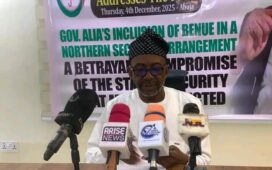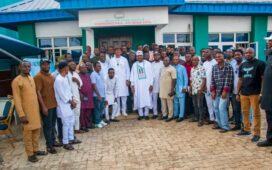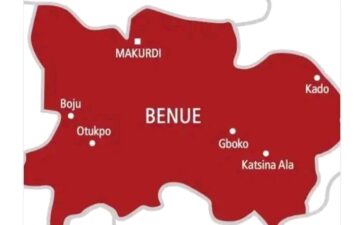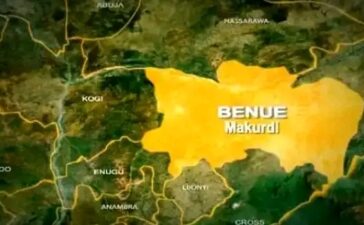Join our WhatsApp channel HERE for the latest Benue news and updates!
The Benue State Government has issued a robust defense of its recent approval to access a ₦100 billion infrastructure loan, countering criticism from the Peoples Democratic Party (PDP) Benue Chapter. The statement, released by Sir Tersoo Kula, Chief Press Secretary to Governor Hyacinth Alia, outlines the administration’s commitment to transparent governance and infrastructural renewal, while accusing the PDP of mismanagement during its tenure.
The loan, unanimously approved by the Benue State House of Assembly, is described as a strategic intervention aimed at fast-tracking critical infrastructure projects across the state. Governor Alia’s administration emphasizes that every kobo of the ₦100 billion facility will be invested in verifiable, people-oriented projects, including the renovation and equipping of general hospitals, construction of science schools, completion of abandoned roads and bridges, and the development of industrial clusters.
The government highlighted the significant infrastructural deficit inherited from the previous PDP-led administration under former Governor Samuel Ortom. According to the statement, Ortom’s tenure left behind a staggering direct debt burden of ₦187.7 billion, later revised to ₦359 billion after uncovering additional local government debts. This included 12 months of salary arrears for state civil servants, 10 months for local government staff, and 36 months of pension arrears, alongside a collapsed infrastructure landscape.
In contrast, the Alia administration claims to have demonstrated fiscal discipline by paying off substantial portions of this inherited debt. Recent figures from the debt management office indicate Benue’s local debt burden has been reduced to less than ₦125 billion, with significant reductions in local government debts. The governor, nicknamed “Mr. 25th” by civil servants and pensioners for his consistent welfare payments, has also cleared backlogs of salaries and pensions owed by the previous administration.
The PDP had condemned the loan as a “reckless fiscal adventure,” but the state government dismissed this as hypocritical and misleading. The administration argued that the PDP’s past governance was marked by wastefulness and opacity, leaving the state in dire need of infrastructural renewal. The Alia government asserts that the loan is not politically motivated but a necessary step to rebuild Benue, with projects publicly outlined in the governor’s request to the Assembly.
The statement further accuses the PDP of democratizing poverty in Benue through its refusal to pay salaries and pensions, and its lack of investment in critical infrastructure. It contrasts this with the current administration’s prudent management of scarce resources and ingenious financial engineering.
Among the key projects to be financed by the loan are:
1. Renovation and equipping of general hospitals to strengthen healthcare delivery.
2. Construction of science schools statewide to promote technical education.
3. Completion of ongoing roads, bridges, and electricity projects abandoned by previous administrations.
4. Building skills acquisition centers to tackle youth unemployment through vocational training.
5. Construction and equipping of smart schools to modernize learning.
6. Further development of the Benue State University of Agriculture, Science, and Technology, Ihugh, to diversify the economy.
7. Development of industrial clusters in the state.
The Alia administration remains steadfast in its mission to restore Benue’s pride as the “Food Basket of the Nation” and urges the PDP to set aside bitterness, acknowledging the state’s progress toward responsible governance. The government warns that political blackmail and emotional outbursts will not derail this transformation.
As Benue embarks on this rebuilding journey, history is poised to remember those who stood for progress and those who stood in its way.
















